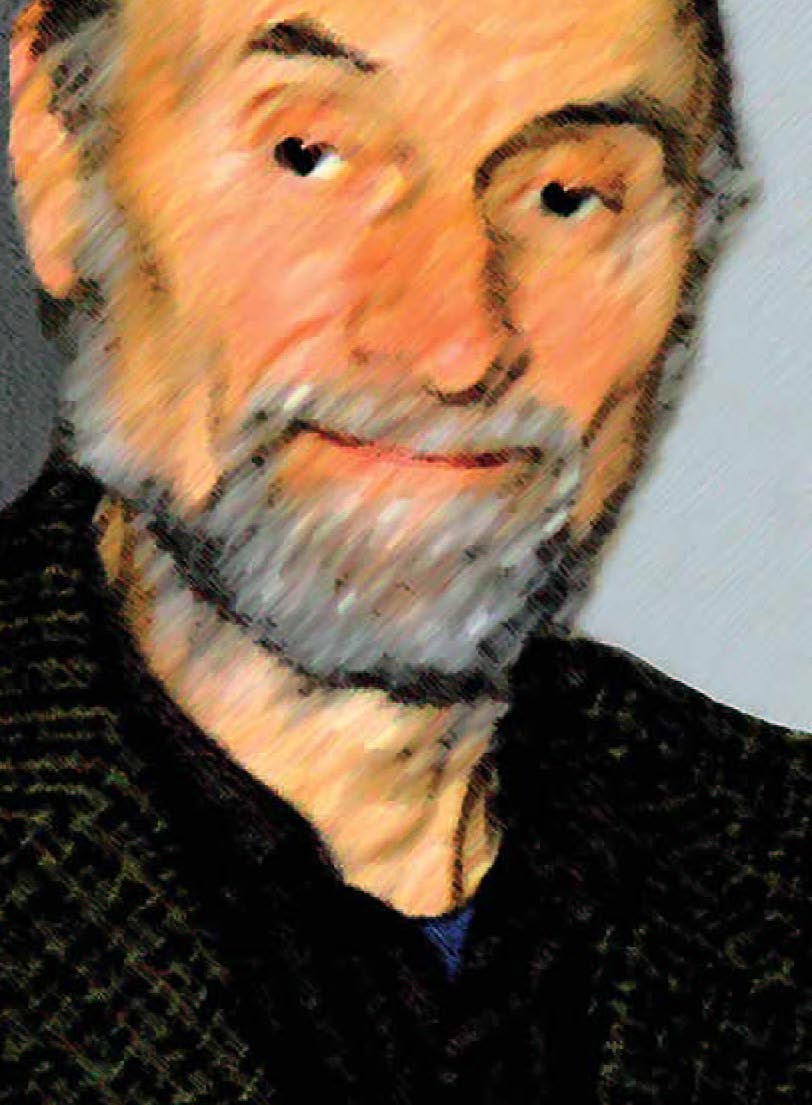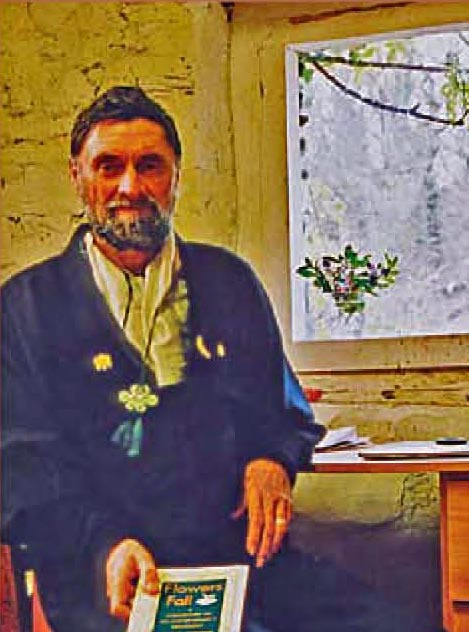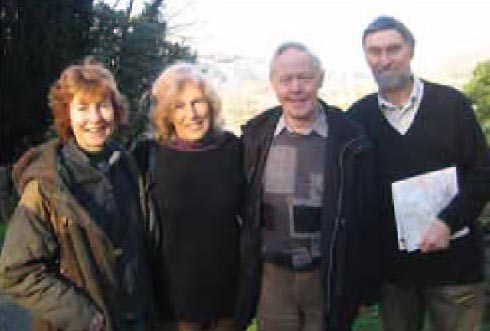Ken Jones - tackling prostate cancer with the Pfeifer Protocol
by Madeleine Kingsley, CANCERactive (originally published in icon Issue 1 2007)
 When diagnosed with prostate cancer, Ken Jones had just chalked up his threescore years and ten. But the retired management lecturer, writer and poet, from rural mid-Wales had no intention of going gently into any kind of dark night. Here, Ken tells icon how, despite his sense of isolation with the disease and the medical shortfalls of NHS Wales, he took control of his fairly aggressive condition, researched and chose serially successful treatments (including the little known Dr Pfeifer’s protocol) and even chronicled his experience in wry, expressive haiku prose. Seven years on he’s still fit, out hill walking and up to splicing a couple of tons of firewood each winter.
When diagnosed with prostate cancer, Ken Jones had just chalked up his threescore years and ten. But the retired management lecturer, writer and poet, from rural mid-Wales had no intention of going gently into any kind of dark night. Here, Ken tells icon how, despite his sense of isolation with the disease and the medical shortfalls of NHS Wales, he took control of his fairly aggressive condition, researched and chose serially successful treatments (including the little known Dr Pfeifer’s protocol) and even chronicled his experience in wry, expressive haiku prose. Seven years on he’s still fit, out hill walking and up to splicing a couple of tons of firewood each winter.
I certainly feel lucky to be alive, which I put down to my very conscientious GP who, found that my PSA level had risen to 11, and nagged until I saw a specialist. Do you want us to cut it out I was then asked or do you prefer radiotherapy? These are pretty serious options you’re offered, and I felt quite alone in the decision-making. What I regret most is that I was misled as to the effectiveness of both these treatments. The medics like to keep it all optimistic: If we cut it out, there it goes in the bucket and that’s the end of it. But surgery doesn’t necessarily remove all the cancer cells, and beam radiotherapy, which was all that was then available in Wales has, I’ve since learned, a success rate (on some estimates) of little more than 50%. But that’s what I opted for, over seven weeks, 180 miles from home, in Swansea. The side effects were relatively mild, tiredness and a little diarrhoea, which didn’t last. I took lodgings, drank plenty of ale with friends, and went home to my wife at weekends.
Some three years later my PSA readings rose again. The cancer was now an aggressive Grade 9 on the Gleason scale, so I was now what the surgeons call ’a salvage case’. A colleague whom I chanced to meet, ironically at a funeral, alerted me to the possibility of cryosurgery again not on offer in Wales. My GP and my Welsh Assembly member fought to get me transferred for some 9000 worth of cryosurgery at the Royal Surrey Hospital. But the Welsh Medical Council turned me down on the grounds that this treatment had not yet been fully approved by NICE. At this point I invoked an old private health policy which Id virtually forgotten: I went off to Surrey, to see surgeon John Davies, whos a remarkable man working on new treatments, like ultrasound, which are still far removed from what is presently available to most men. I had every confidence in him. My six-hour cryosurgery in November 2005 and the subsequent recovery didn’t go off as well as usual, in that I had to have a catheter for six months to keep the urinary channel open.
Six months after the cryosurgery my PSA was down to 1.9. I then decided to try Dr Pfeifers approach. In retrospect, the timing was probably unwise, though you might, conversely, see it at as a happy accident. Id heard about it through a herbalist, and found out what I could which was not really enough on a website. Ive since discovered a much more useful site where you are advised against employing the protocol unless your PSA is at least over 2, and then only under medical supervision. It seems to me a treatment for the quite well-to-do or well insured. From his clinic in Switzerland, Pfeifer has been achieving remarkable results on men with very advanced prostate cancer so much so that Bart’s has run a small Pfeifer trial too. I just bought some 800 worth (to last six months) of the various herbal extracts, and treated myself. It must be pretty serious stuff as my PSA reduced to under 0.5 in three months (or was this also due to the cryosurgery?), and I had only one side-effect sensitive nipples that you can also get with orthodox hormone treatment. The protocol is simple enough to take just a series of the usual pills and capsules, but the intakes need to be varied in accordance with monthly PSA readings to be fully effective. After that very low PSA reading I reduced the protocol intake by half.
Four months on, my reading was 1.6. Should my PSA levels rise again, (and I have quarterly readings at my own request), then I shall consider repeating the Pfeifer treatment. The conventional approach would be hormone treatment, which can prolong the status quo for up to four years before spread beyond the prostate gland.
 I’ve been a practising Zen Buddhist for decades. I think thats influenced my attitude, because in a funny way I dont regret the cancer at all. Its made my life more real, though its a strange kind of life, fighting off your condition and living your life in three month spans, always waiting for the next funny little set of decimal points.
I’ve been a practising Zen Buddhist for decades. I think thats influenced my attitude, because in a funny way I dont regret the cancer at all. Its made my life more real, though its a strange kind of life, fighting off your condition and living your life in three month spans, always waiting for the next funny little set of decimal points.
Ed: This Issues Living Proof reads more like a Testimonial than our usual in-depth Living Proofs. This is quite deliberate.
Almost three years ago we began bringing you news of Ultrasound and its effective use with Hyperthermia. Then we brought you several articles on HIFU High intensity Ultrasound, which was extensively on offer to Prostate patients in Europe and had yet to be fully recognised in the UK. HIFU is particularly relevant in cases where the cancer is localised. The treatment is now available in a number of UK cancer hospitals and privately in Europe. For the past year we have been bringing readers news of the Pfeifer Protocol, where clinical trials in Switzerland are showing this protocol successful in 65% of the patients that Dr. Pfeifer has used it on, even though it has largely been used with patients that have either failed conventional treatments or have been unable to tolerate them.
It is important to note that Ben Pfeifer’s protocol is for hormone refractory prostate cancer and the results vary, depending upon the case. The protocol has been less successful when not tailored to the PSA level and/or when patients stop taking their normal conventional medication.
Pfeifer’s protocol for hormone-refractory prostate cancer is a regime of natural health supplements herbs, glyco-nutrients, vitamins and minerals. These nutrients come in the form of four commercially available food supplements Prostasol, Biobran, Imupros and Curcumin Complex.
Despite this all-natural-compound protocol being the sort of treatment usually ridiculed by the more conservative corners of the UKs medical orthodoxy, Pfeifer simply cannot be labelled a Quack far from it. Professor Pfeifer was the Director for Clinical Research at the Aeskulap Clinic in Switzerland a cutting edge healthcare centre, which combines conventional orthodox medicine with complementary therapies in the form of clinical holistic medicine. Pfeifer carried out his medical training in Germany and went on to specialise in Cancer Immunology, receiving an Immunological Research Prize in Florida, USA. He has had 59 publications in peer reviewed medical journals and has presented numerous papers at medical conferences. The protocol has been subjected to clinical trials and has support amongst certain medical professionals in the UK. It is interesting to note that Pfeifer has now left the Swiss Clinic and they are relatively muted about where he has gone.
Al Smith, whose website is prostatecancernow.org was the first patient on the protocol in the UK and offers support and information to other sufferers.
As always we recommend a 4-point approach to Prostate cancer.
1 Work under your Medical experts supervision at all times
2 Do not rush in to any treatment, unless the cancer has clearly spread and is known to be aggressive. Practice Active Surveillance as recommended by top hospitals such as the Royal Marsden.
3 If the cancer is contained, consider HIFU Ultrasound or surgery with an expert who has a lot of experience with RP
4 If the cancer is a later stage hormonally driven cancer consider the Pfeifer Protocol.
For a full and unique overview of Prostate cancer, readers should click here and for the Pfeifer Protocol click here .